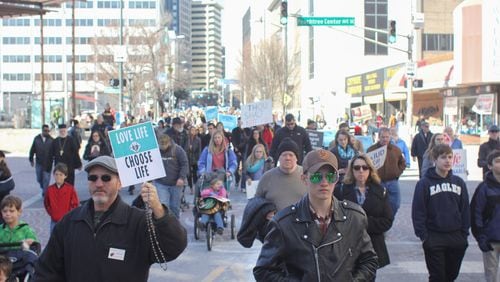Anti-abortion activists say recent developments at the U.S. Supreme Court have reinvigorated their fight at the Georgia Legislature six months before the start of the 2019 session.
The Supreme Court last week ruled that staff members at anti-abortion crisis pregnancy centers don't have to provide information about abortion to women seeking services from their facilities. The decision came the day before Supreme Court Justice Anthony Kennedy, who has been viewed as a supporter of abortion rights, announced his retirement from the bench.
Replacing Kennedy with a conservative jurist could spur anti-abortion activists to further action in Georgia.
“There may be some efforts in various states and maybe even nationally to kind of test the waters on what we can do to protect human life,” said Virginia Galloway, the regional director for the Faith & Freedom Coalition, a conservative public policy organization.
Abortion-rights activists say they are preparing for potential fights that may come down the line by rallying voters to the polls in November. State Democratic lawmakers are holding a press conference Tuesday to discuss the pending changes to the makeup of the Supreme Court.
Mike Griffin, a pastor who lobbies for the Georgia Baptist Mission Board, said Georgia hasn't passed restrictive abortion legislation since 2014, when lawmakers voted to bar the state employee health insurance plan from covering abortions in most cases.
“Everything is on the table,” Griffin said. “Georgia has two legislative bodies that are strongly made up of pro-life legislators. … Georgia is due for some good legislation.”
A bill that would have increased the burden on a minor seeking to avoid notifying a parent or guardian if she is getting an abortion passed the state Senate but stalled in the House.
Griffin said he expects to urge the passage of “personhood” legislation, which would extend legal rights to fertilized eggs. He equated the need for the legislation to fighting slavery.
“The reason African-Americans were mistreated was because they were not considered to be persons,” he said. “The last disenfranchised group in our country is the unborn. They are not being protected. They have a right.”
Many times lawmakers who may personally support limiting access to abortion will stop short of voting for “personhood” legislation, worrying a potential lawsuit wouldn’t make it through a challenge in the nation’s highest court.
Some political observers say the developments could set the stage for a legal battle that would overturn the 1973 Roe v. Wade decision that established the constitutional right to have an abortion. Kennedy has been considered a swing vote by those on both sides of the issue.
President Donald Trump’s replacement could change that balance.
Locally, both Republicans vying to be the party’s nominee for governor in this month’s runoff election chimed in supporting a Mississippi law passed earlier this year that bans abortions after 15 weeks — the tightest restrictions in the country.
Republican candidate Brian Kemp, Georgia’s secretary of state, said he would seek to surpass those limits if he’s elected. His opponent, Lt. Gov. Casey Cagle, said he will “defend life at all stages.”
Stacey Abrams, the Democratic nominee for governor, said she opposes enacting further restrictions on abortions in Georgia.
The South Carolina Legislature debated several bills that would have effectively banned abortion, including one that would have established “personhood,” but none cleared that state’s General Assembly before its session ended.
Though Republicans hold both legislative chambers and the governor’s office in Georgia, Democrats hope to not only chip away at the majorities in the House and Senate, but also to take the state’s highest political office back for the first time since 2003.
State Sen. Nan Orrock, D-Atlanta, said the best way to stave off attempts from opponents of abortion is to elect Abrams.
“The best thing we can do is to bring to the state leadership the kind of leaders that essentially support women’s basic human rights because that’s what this is about,” she said. “I have very strong hopes that that is going to be the showstopper.”
State Sen. Elena Parent, D-Atlanta, said Georgians generally don't support completely outlawing abortion.
“In a state that’s getting much more competitive and is not a hard-right state, pursuing hard-right abortion policies would be out of touch with the center of the electorate of Georgia,” she said.
State Rep. Wes Cantrell, R-Woodstock, a pastor and abortion opponent, said he hopes to meet with colleagues this fall to discuss the best options going forward.
“I want something that’s actually going to make a difference, not something that we can pat ourselves on the back and feel good about,” he said. “But something that’s actually going to result in more unborn lives being saved, more adoptions and more kids going to foster care.”
Stay on top of what’s happening in Georgia government and politics at PoliticallyGeorgia.com.
About the Author








